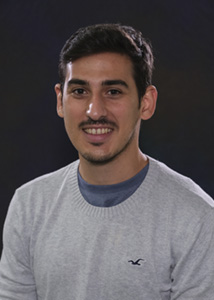
Investigator:
Carlos Soto-Faguás, PhD
Name of Institution:
Oregon Health & Science University (OHSU)
Project Title:
The effects of the ApoE Christchurch variant on Lewy body pathology development and spreading
Investigator Bio:
Dr. Soto-Faguas completed his undergraduate studies in Basic and Experimental Biomedicine at the University of Seville (Spain) in 2015, where he had his first contact with the neuroscience field working with a mouse model of Parkinson’s disease (PD) in the laboratory of Professor Jose Lopez-Barneo. He then obtained a master’s degree and his PhD in Neurosciences from the Autonomous University of Barcelona (Spain) under the supervision of Professor Carlos Saura. His work was focused on the relationship between presenilin, the main genes implicated in familial Alzheimer’s disease (AD), and tau pathology, using transgenic mouse models. In December 2021, Carlos joined Dr. Vivek Unni’s lab at OHSU as a postdoctoral fellow to investigate the role of tau protein in alpha-synuclein (a-syn) propagation and to study the role of the ApoE Christchurch mutation in PD and AD.
Objective:
To explore the effects of the ApoE Christchurch mutation in the development and propagation of a-syn pathology using transgenic mouse models.
Background:
Recent genetic studies have highlighted the importance of the ApoE genotype in the severity of AD as well as in the development of dementia in patients with PD. A recent report found a woman who was resilient against dementia despite being genetically predisposed to the development of AD pathology. This patient harbored a rare genetic mutation in the ApoE gene, called ApoE Christchurch, that has since been suggested to be protective against AD pathology and clinical dementia.
Methods/Design:
In this project, we generated a new transgenic mouse model that expresses the ApoE Christchurch mutation to study the effects of the ApoE Christchurch mutation in PD pathology. Using histological and imaging techniques, we will investigate whether this mutation is protective against the development and propagation of Lewy bodies, the pathological hallmark of PD, after the injection of a-syn preformed fibrils into the mouse brain.
Relevance to Diagnosis/Treatment of Parkinson’s Disease:
This proposal is focused on an unexplored research topic to date, that will allow us to further understand the molecular mechanisms of Lewy body disorders, opening windows for new therapeutical targets and therapies.
